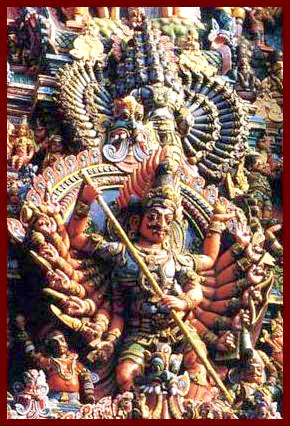AGNI, GOD OF FIRE

by Stephen T. Naylor
Agni is one of the most important of the Vedic gods. He is the god of fire, the messenger of the gods, the acceptor of sacrifice. Agni is in everyone’s hearth; he is the vital spark of life, and so a part of him is in all living things; he is the fire which consumes food in peoples’ stomachs, as well as the fire which consumes the offerings to the gods. He is the fire of the sun, in the lightening bolt, and in the smoke column which holds up the heavens. The stars are sparks from his flame. He was so important to the ancient Indians that 200 hymns in the Rig Veda are addressed to him, and eight of its ten books begin with praises dedicated to him.
Agni is closely associated with Indra, and is sometimes said to be his twin brother. Thus Dyaus Pita and Prthivi are named as two of his parents. But he has many more. Sometimes Kasyapa and Aditi are his parents; another time he is the son of a queen who keeps his birth secret from her king. He was born, like Indra, in full power and vigor. Agni is also said to be the son of ten mothers who are all sisters; these are the ten fingers of man. Another story tells that he consumed his parents when he was born, as they could not provide for him; this is symbolic of the fire born when two sticks are rubbed together which quickly are burned up by it. Dawn and Night are his sisters, his wife is Svaha, and he is the father of Karttikeya.
When Agni is described in anthropomorphic form, he sometimes has two faces which are smeared with butter. He has seven fiery tongues and sharpened, golden teeth. He is red in color, with black eyes and wild, black hair. He has seven arms and three legs, and seven rays of light emanate from his body. He either rides on a ram, or on a chariot, pulled by goats or sometimes parrots.
Agni loves all his worshipers equally, and so is loved in turn by all of them. He visits everyone’s hearth, no matter if they are rich or poor. He is the mediator between the gods and mankind. He is a great consumer of Soma. When people use fire, they must face it toward the proper direction for different uses. When facing East, the fire should be used for sacrifices to the gods; when facing South, the fire should be used for sacrifices to the Manes or spirits of the dead; a cooking fire should always face toward the West. The proper offering to Agni, and hence all the gods, is ghee, which is clarified butter. Agni also had the power to impart immortality on mortals, as well as remove all sins at the time of one’s death.
In later times, Agni’s worship fell off dramatically. He became an incarnation of either Shiva or Brahma. Eventually he has come only to be called on by lovers, and by men who wish to increase their virility.




